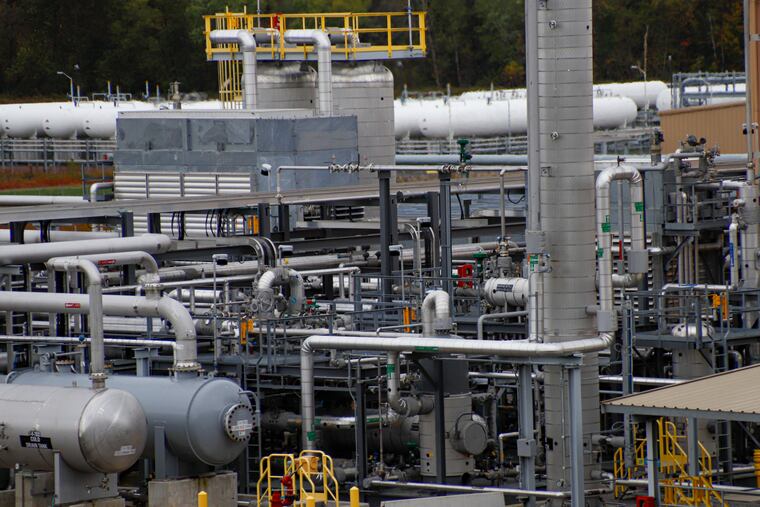Why Pa. should lead on liquefied natural gas exports
A liquefied natural gas export terminal would create jobs, grow the economy, and help our allies overseas.

Pennsylvania is the country’s second-largest producer of natural gas, an industry that, according to the American Petroleum Institute, has created and sustained hundreds of thousands of jobs and contributed billions to the state’s economy. Blessed with abundant shale gas reserves and proximity to European markets, Pennsylvania should also lead on liquefied natural gas (LNG) exports.
This year, a bipartisan effort is underway to examine how Pennsylvania can export liquefied natural gas.
Established by Act 133 of 2022, the Philadelphia LNG Export Task Force is exploring opportunities for moving liquefied natural gas through the Port of Philadelphia.
The advantages of hosting a liquefied natural gas export terminal are numerous, including job creation, economic growth, and the opportunity to help our allies overseas by supplying affordable, reliable, and clean natural gas. The ongoing war in Ukraine has only heightened this need.
On the economic side, the terminal would generate jobs that benefit the economy in our region. Construction jobs, for example, could be in the hundreds or even thousands, depending on the scope of the project. Permanent jobs would also be available to Pennsylvanians. At Maryland-based Cove Point LNG, the first-of-its-kind facility on the East Coast, approximately 3,000 construction jobs were created.
At the local level, having a liquefied natural gas export terminal may spur additional growth and opportunity for small businesses, such as construction and service companies. On a broader scale, liquefied natural gas export facilities represent tens of billions of dollars of investment across the country.
In addition to the economic impacts, increased use of natural gas in the power sector has helped to drive down carbon dioxide emissions to generational lows. With its abundance of shale gas, Pennsylvania could help supply our European allies with much-needed energy as Russia continues to wage war on Ukraine and weaponize natural gas.
At a public hearing in April, former Ohio Rep. Tim Ryan provided testimony to the Philadelphia LNG Export Task Force showing that Europe “had to revert to restarting mothballed coal plants to keep the lights on following Russia’s invasion of Ukraine.”
“In the absence of natural gas, the world burns dirtier forms of energy, namely coal,” Ryan said.
Significantly more U.S. liquefied natural gas could be necessary to fully meet the demand in European gas markets. To meet this need, our country will have to further expand its export capacity, and the European Union will need to bolster its import capacity over the next few years.
According to the U.S. Energy Information Administration, European liquefied natural gas imports increased to an all-time high in 2022, 65% more than the previous year. Europe’s liquefied natural gas import capacity also expanded and is expected to grow by one-third by the end of 2024.
Natural gas from Pennsylvania should be part of the global energy solution. It has proven to be a powerful tool that is helping the U.S. meet emissions reduction goals.
For Pennsylvania to continue growing its energy sector and playing a role in reducing emissions, our leaders must support the development of our abundant natural resources and embrace an all-of-the-above approach to energy. This means that we expand our energy options, not restrict them, to ensure the U.S. and our allies have access to reliable, affordable energy supplies. In short, we must utilize all available energy sources. And with the Marcellus Shale underlying approximately two-thirds of Pennsylvania, our state has the second largest natural gas reserves in the country, behind only Texas.
Clearing the way for liquefied natural gas exports in Pennsylvania would be a big win, both for the economy and for the environment. However, permitting reform will also need to be part of this discussion. Timely and transparent permitting processes are needed to attract investment in a liquefied natural gas export terminal and support the infrastructure needed to move the product to port.
The bipartisan Philadelphia LNG Export Task Force is a step in the right direction to better understanding how we, as a state and region, can secure investment for a liquefied natural gas export terminal, and the economic gains that could follow. We can support our allies overseas, work toward a lower-carbon future, and strengthen our state’s economy by establishing a liquefied natural gas export terminal in the Port of Philadelphia.
For jobs, economic growth, and emissions reductions, we need progress on important projects like this in Pennsylvania.
Becky Corbin is a former member of the Pennsylvania House of Representatives and served on the Environmental Resources and Energy Committee. Her professional background and training is in the field of chemistry.